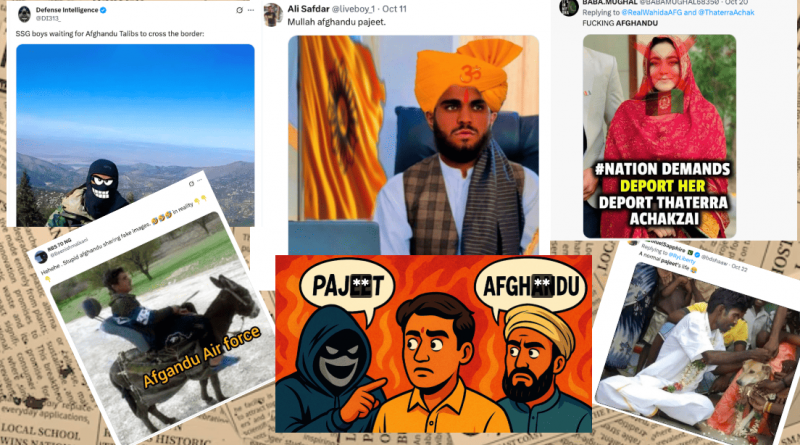Afgh*ndu for Afghans, Paje*t for Indians: Pakistan’s Digital Hate Factory
When hate speech targeting Afghans and Indians emerges from Pakistani-online spaces, it spills into wider global contexts—European suburbs, Canadian campuses, the Gulf labour markets.
In the fast-moving world of social media, we tend to dismiss hateful language as noise – careless insults, juvenile trolling. But that is a mistake. The damage done by words in this digital era is real—and sometimes lethal.
On platforms open to millions, slurs once hidden in fringe forums can metastasize into mainstream discourse, softening the path for discrimination, exclusion and violence. The global community must pay attention when organised campaigns emanate from one country’s online ecosystem, targeting whole populations elsewhere.
Specifically, we need to look hard at campaigns driven by Pakistan-based troll networks targeting both Afghans and Indians—because what appears as casual insult is in fact coordinated communal dehumanisation that crosses borders and deserves far greater scrutiny.
Two fronts of online hate
One front involves Afghans. The phenomenon of anti-Afghan sentiment is hardly new in the region, but what is alarming is how online Pakistani-origin networks have weaponised slurs like “Afghandu” (or variants thereof) to refer to Afghan refugees, migrants or even Pashtuns in Pakistan with Afghan origins.
These trolls mock Afghans as criminals, freeloaders, invaders — they cast entire communities as disposable and foreign, worthy only of scorn. That echoes long-standing prejudice but now moves unchecked into digital streams, where it reaches across geographies.




The second front involves Indians. In this case the slur “pajeet” (and its variants) has surfaced aggressively online.
According to the overview of the term, it originated on forums like 4chan and then made its way into broader platforms. What matters is not only that such a word exists, but that independent monitoring shows anti-Indian posts using it have spiked, with views counted in the tens of millions — indicating that this is not niche trolling, it is high-impact hate content.
These two strands may not always come from identical networks, but they share the mechanics: organised or semi-organised campaigns, cultural prejudice, coded language, and amplification.



Why it matters
You might say: these are just slurs, just trolling — let people speak their mind, free speech and all that. But that’s naïve. Research shows that when a group becomes the butt of organised digital mockery, the consequences go far beyond insults.
The study of hate speech in social media demonstrates that patterns of language—coded slurs, dehumanising labels—are upstream predictors of real-world violence.
For Afghan refugees in Pakistan, many of whom live in precarious legal status or under threat of deportation, the online vitriol reinforces physical insecurity and social marginalisation. When every social-media joke says “they don’t belong here”, the next step is often “why should they?”
For Indians abroad: what begins with “job-stealing” narratives or references to “dirty Indians” or “pajeets” can escalate into harassment, threats, even assaults. A slur becomes a statement: you are lesser, you are outside, you can be attacked.
The digital echo-chamber matters because it amplifies and normalises. And when a slur becomes accepted, it tarnishes entire populations, and sets the stage for the next worst step: discrimination, denial of rights, exclusion — and ultimately violence.
The Pakistani dimension (and why we must call it out)
Let’s be blunt: we’re not talking about a few rogue tweets. There is a pattern here with a Pakistani-origin dimension which we must call out frankly—not to stigmatise all Pakistanis, but to confront the source of many of these messages.
Some Pakistani users deploy the “Afghandu” slur when mocking Afghan refugees (or even Pakistanis of Afghan origin). Others embed “pajeet” in anti-Indian campaigns, sometimes coordinating across platforms, sometimes via diaspora networks or regional influence operations.
The danger is that if the Pakistani-origin digital networks marinade in these slurs, they spread outward — reaching diasporas in Europe, North America, Gulf regions. The conversation isn’t contained within South Asia. The rhetoric becomes transnational.
Let’s emphasise: this isn’t about diplomatic finger-pointing for its own sake—it’s about recognising where the seed-beds of online hatred are, so that civil society, platforms and global actors can target the origin rather than only treating the symptom.
What must be done — and done now
Here is where we get practical. If you are in the human-rights world, involved in digital civil-society, or part of a platform that hosts content, there are clear actions:
First, document. Start systematic recordings of “Afghandu” slurs in Pakistani-origin online communities: screenshots, trending hashtags, memes, high-traffic posts. Data is your lever. Without it, platforms treat these as isolated “jokes”.
Second, flag and report. When you see those specific slurs used in targeted harassment of Afghans or Indians, report them to major platforms (X, Telegram, Meta Facebook). Insist the slurs — not just the general harassment — be recognised explicitly in platform hate-speech policy updates.
Third, engage local civil society. Partner with Pakistani human-rights groups, digital-rights NGOs, Afghan-refugee organisations, Indian-diaspora organisations. Map the pipeline of hate from Pakistan-based networks to their international amplification. Understand how memes move, how diaspora picks them up, how they reverberate.
Fourth, press platforms for accountability. Demand transparency: How many posts with “Afghandu”? How many accounts removed? How many hashtags blocked? Use empirical models (such as those in the work by Network Contagion Research Institute at Rutgers University) to hold platforms’ feet to the fire.
Fifth, elevate the voices of the targeted. Allow Afghan and Indian victims of this digital hate to speak. Let their testimonies accompany the data — emotion alone won’t shift policy, but data plus lived experience will.
Why the world cannot stay silent
This is not merely a regional problem. Pakistan, Afghanistan and India do not exist in isolation. The region is deeply connected via language, migration, diaspora, regional policy flows. When hate speech targeting Afghans and Indians emerges from Pakistani-online spaces, it spills into wider global contexts—European suburbs, Canadian campuses, the Gulf labour markets.
If we don’t act now, we risk letting a cycle normalise: a slur becomes accepted, a stereotype becomes social, the next step is exclusion and violence. The Network Contagion research warns that online hate speech is an upstream predictor of real-world attacks. It is not abstract.
That means this isn’t merely some digital nuisance; it is a window into where oppression finds its pathways.
A final word
To human rights defenders: refuse the excuse of “just trolling.” Words matter. Slurs matter. When the term “Afghandu” is flung at refugees, when “pajeet” appears in job-theft threads against Indian professionals abroad, we cannot shrug and say “it’s just free speech” and move on.
It is time to call it by name, to act with our full arsenal: documentation, platform pressure, civil-society partnerships. And yes: to hold Pakistani-origin digital networks accountable for their role — not out of spite, but out of concern for human dignity and the principle that nobody should be reduced to a hateful label because of their origin.
Afghans. Indians. Whatever your nationality or language—recognise this pattern, push against it. The international human rights community needs to step in — not later, when it is too late, but now.
Disclaimer: Views expressed by writers in this section are their own and do not reflect Milli Chronicle’s point-of-view.



